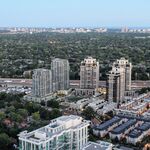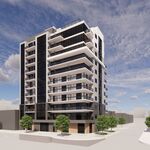But practically speaking, the only rational place for a Pacific Mall-style condo-mall would be, well, where the existing Albion Mall is, or on one of the neighbouring parcels. And if you're so cynical about fostering "Euro streets" (or urban gardening) where there is, in your eyes, no natural inclination t/w them, who's to say that transplanted Asian-style condo malls amidst the commie blocks would fare any differently? Or, if they don't become barren failures, they could become offputtingly "ghetto" like, er, Dr Flea's not too far west of here--that is, if one wanted to pile cynicism atop cynicism, if the proximity of Dr Flea's didn't cancel out the necessity for such an array in the first place. In which case, you might as well either preserve the "do nothing" status quo, or implode the whole furshlugginer lot of them.
I used to grow tomatoes & berries in my backyard, but squirrels and raccoons took most of the harvest. Anyways, if people want to grow stuff for general recreation that is one thing. Having the City going around and toying with the zoning code in order to promote it seems unnecessary and counter productive. I don't have to think too abstractly to picture a situation where the City would zone a small patch for agriculture, which nobody would have an interest in using, thereby precluding other developments which may have a use. Certainly sounds familiar given how the City deals with some industrial properties. One nice thing about the older commie blocks is that they usually have good balcony space. With a little bit of effort, most casual gardening could take place there with poor man hydroponic rigs.
(Some people do take urban agriculture seriously as a food supply. Most people who do small scale gardening don't, but there is an increasingly visible trend towards a mashup of left wing dietary fads. This is misguided}
Then again, a lot of what was dismissed as "misguided" "left wing fads" back in the 70s, the realm of the granola-munchers who tagged along John Sewell's mayoral-campaign proto-Jane's-Walks, have transcended their own faddom and filtered their way into the mainstream over the years--and not just among the Stuff White People Like crowd, either. (Really, it isn't like they're proposing transplanting Wychwood Barns to Rowntree Mills.) Otherwise, you might as well advocate abolishing the Blue/Green Bin programmes as well, not to mention, uh, evicting the "squatters" from Toronto Island. Maybe you ought to take a cue from Rob Ford and argue that the city shouldn't be wasting tax dollars by promoting *anything at all*.
Look: it isn't like "promoting" urban gardening in this fashion is automatically doomed to failure--and besides, there's still something way too flippant about your dismissal of so-called "casual" home gardening. I mean, raccoons and squirrels haven't dissuaded many a Dufferin/St Clair/Eglinton-zone resident from setting up
and making genuinely good use of their grape arbours, tomato patches, etc. Nor has natural vermin stopped my mother from such gardening--pesticide free, mind you; because if there's anything worse than coons and squirrels, it's that season she tried pesticide and all the honeybees disappeared. It's a great, active, therapeutic experience; maybe it's not everyone's cup of tea, but neither are the recreational programmes offered at our community centres. And if it didn't work out for you, maybe you just don't have the knack. Don't take it out on others. And don't automatically assume that it's something "nobody would have an interest in using": you seem to have this way of projecting a terminally glum, insular, couldn't-care-less anomie upon the residents.
High Park is a park. It is meant to be verdant, an oasis of nature so to speak.
Yet ironically, if you want to put it that way, there's an argument (which I've heard alluded to, though I don't subscribe to it) that allotment plots get in the way of said verdancy.
One of th main impetuses for this Tower project is that tower clusters have too much open green space. Community farming wont fix that. If anything it could worsen it, as people wouldn't be able to cross over previously barren fields for fear of trampling plants.
Uh, yeah, as if "community farming" in practice were nothing but a Chinese Wall of a horror vacuii of trample-able plants. And by that measure, wouldn't filling in that green space with buildings "worsen it" even more?
Remember: it isn't just a matter of "too much open green space". It's a matter of too much
purposeless open green space...




